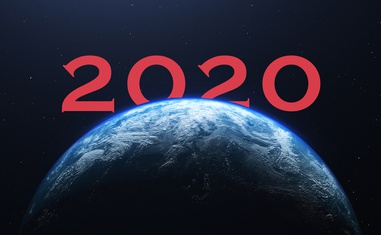The views expressed in our content reflect individual perspectives and do not represent the official views of the Baha'i Faith.
Trying to sum up the year 2020 calls to mind words like seismic, unprecedented and tragic—but they all fall short of capturing the magnitude of what we’re going through as a global community.
You may have some words you’d like to apply to this tough year—a few of them probably unprintable here—but I would like to propose invoking a term that, while not exactly in common parlance, captures this truly unique time.
The word in question is ‘epoch’ and the Merriam-Webster Dictionary says that it refers to, “a period begun or set off by some significant or striking quality, change, or series of events.” Names of previous epochs include the Middle Ages, the Renaissance, and the Enlightenment. What we are living through at the moment is certainly epoch-worthy, so framing our current chaos in these terms helps to give shape and form to what can otherwise seem amorphous and apocalyptic.
Let’s clarify that the word epoch has two distinctly different definitions. What is described above refers to historical epochs. Geological epochs, on the other hand, are defined by evidence in rock layers and measured in millions of years, with names like Miocene and Middle Jurassic.
Register for a Bahai.chat conversation with Hugh Locke on ‘Navigating the Double Epoch’ Saturday February, 27 2021
So why mention both together, given that they never occur simultaneously? In fact in all of human history, new geological and historical epochs have never been concurrent—that is, until now.
Let’s start with those rock layers. We are just over 11,500 years into Holocene, the geological epoch that was supposed to last several millennia. However, the Dutch Nobel Prize-winning atmospheric chemist Paul Crutzen advanced a theory in 2000, now well-accepted among his scientific peers, that we have already begun a new epoch—millions of years ahead of schedule. He named it “Anthropocene,” with “anthrop” referring to the human impact on the environment through pollution, fossil fuel and greenhouse gas emissions, habitat destruction, and both plant and animal extinctions.
Crutzen’s hypothesis—that human activity in the roughly 200 years since the Industrial Revolution is on such a scale that it is already being recorded in the Earth’s rock layers—hence defines a new geological epoch. (It should be noted that not everyone in the scientific community agrees, and that the name Anthropocene has yet to be officially adopted by The International Union of Geological Sciences, the world’s geological governing body.)

Adding further weight to Crutzen’s argument is a new article published in the scientific journal Nature. The authors peg 2020 as the year when human-made materials (such as concrete, asphalt, plastic and metal) now outweigh all living things on Earth—the biomass which includes every plant, animal, insect, fungi and human being. The authors were clearly not waiting for the above-mentioned official name recognition when they wrote, “… human enterprise gives a mass-based quantitative and symbolic characterization of the human-induced epoch of the Anthropocene.”
The corresponding historical epoch currently taking shape is so new it doesn’t yet have a recognized name. When eventually given its moniker, I believe the epoch’s zeitgeist—the unique spiritual, intellectual and cultural attributes by which it will be known—will invoke oneness in some way. That eventual name should and likely will reference the moment in history when we set about to reorganize ourselves as a species using oneness as a core and transcendent principle, just as the Baha’i teachings indicate in this excerpt from a talk that Abdu’l-Baha, the son and successor of Baha’u’llah, gave at Columbia University in 1912:
All the divine Manifestations have proclaimed the oneness of God and the unity of mankind. They have taught that men should love and mutually help each other in order that they might progress. Now if this conception of religion be true, its essential principle is the oneness of humanity. The fundamental truth of the Manifestations is peace. This underlies all religion, all justice. The divine purpose is that men should live in unity, concord and agreement and should love one another. Consider the virtues of the human world and realize that the oneness of humanity is the primary foundation of them all. Read the Gospel and the other Holy Books. You will find their fundamentals are one and the same. Therefore, unity is the essential truth of religion and, when so understood, embraces all the virtues of the human world.
Navigating the Double Epoch
The new epoch of oneness obviously recognizes that by default, rather than by design, humanity now functions as one extended, integrated and interdependent global community.
The problem is that we lack an effective form of global governance to manage that community. The absence of a coordinated worldwide response to the coronavirus pandemic, as just one example, has shattered the illusion that humanity can effectively manage its own affairs as things now stand. Cobbling together ad hoc solutions held together with the diplomatic equivalent of tape and bits of string clearly does not work, and has resulted in the illness and death of millions of our fellow human beings.
There is widespread support for change, even in the absence of a new model of governance to rally behind. A survey across 14 countries this summer by the Pew Research Center found that many believe greater global cooperation could have reduced the human toll from Covid-19. The same poll revealed strong support for taking the interests of other countries into account, even if this requires compromise.
The current absence of coordinated and collective action at the international level means that localized and manageable problems can escalate, sometimes within months as with the coronavirus pandemic, and quickly become world-encompassing. Each subsequent crisis further burdens and erodes an already inadequate governance structure, making it even less capable of responding to the next problem before it becomes a crisis.
Putting aside this classic Catch-22 scenario, another approach is to apply the adage that it takes a crisis to effect change. Viewed through this lens, we should look for positive initiatives and inflection points within the responses to our current panoply of global crises.
In this latter conceptual framework, change does not necessarily come from governments or existing international institutions. Instead, much of the real change is being led by the creative individual efforts of innovative thinkers and artists, diverse popular movements, innovative social and economic development programs, new forms of humanitarian aid, and leadership from the business community.
None of these initiatives has yet changed the fundamental way the international community conducts its affairs, but all seek, in one way or another, to define new international norms and solutions that transcend national boundaries while acknowledging a diversity of country and regional-level responses. They all depend on a broad and multi-sectoral engagement, which represents a truer reflection of who we are as a human family, in contrast to our increasingly divisive elected governments.
Two of these crisis responses in particular, I believe, hold the key to a larger global reordering: the new US-led people’s movement to root out systemic racism; and the heightened urgency behind worldwide efforts to combat climate change. In the final two essays in this series, we’ll look at these two crucial issues and examine some of the solutions provided by the Baha’i Faith and the diverse global community it has successfully built.

















Comments
Sign in or create an account
Continue with Facebookor